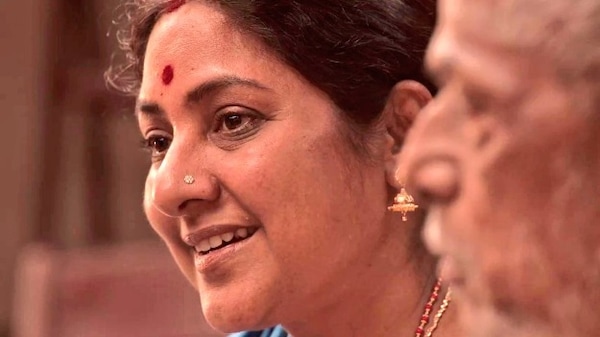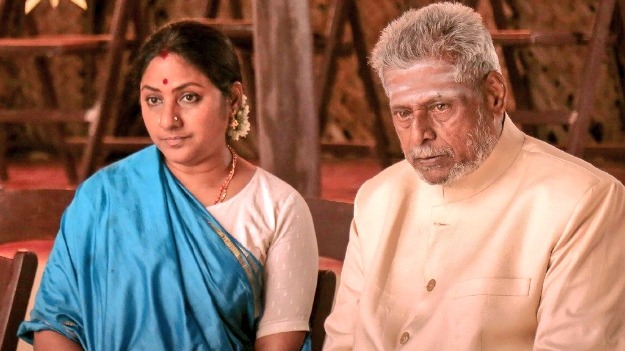Exclusive! Rohini: I approach all the characters I take up with the same openness and eagerness
Actress Rohini gets candid about Navarasa, which is releasing this Friday on Netflix, her plans to make another film and her plans to revive the theatre scene in Tamil Nadu

Rohini
Last Updated: 09.17 PM, Aug 02, 2021
Despite having more than 100 films to her credit in different languages, Rohini, who has been a name to reckon with in south cinema, says she still approaches every film with the same enthusiasm. The actress who feels content for having associated with the anthology Navarasa, which will release on Netflix in a few days, considers that being part of her segment, Payasam, in it was an opportunity to meet many talented artists and directors again. In a chat with OTTplay, she opens up on the various possibilities of digital platforms, her tryst with the theatre scene, her directorial project, Appavin Meesai, the surge in the number of women-centric movies and why she believes theatre and films should go hand in hand. Excerpts from the interview…
With a bevy of veteran filmmakers and talented artists, Navarasa is riding high with expectations. How has been your experience working for project?
Most of the people associated with the project are loved by audience from a long time. For me, this was a great chance to meet several directors and actors once again. Our job is to entertain, and here we are at it again, through this wonderful collaboration which was made despite numerous restrictions caused by the pandemic. It will be a thorough entertainer which deals with various emotions in an intense manner.

Payasam touches upon the emotion ‘disgust’. Could you elaborate on working in a film which deals with the raw emotion?
Vasanth wanted me to come on board and I gave a nod as I was impressed with the story and my character. The feeling of disgust is evoked through a series of incidents; the director has ensured that the viewers will relate to the emotion. I’m quite thrilled with the response Kannunjal song received and the way it has been shot proves the craftsman Vasanth is. I am not at a liberty to reveal anything more. People will get to watch it in a few days and I’m as excited as them as I haven’t watched the other segments of Navarasa.
The film has a veteran like Delhi Ganesh and a newbie like Aditi Balan playing prominent roles along with you. Tell us about the experience of artists from different generations sharing screen space for an initiative like this…
Aditi is a refreshing actor, her choice of films speak volumes about her approach towards the craft of acting. Be it the projects she has done in Tamil or Malayalam, she comes across as a thinking actor. The young actors, these days, are so talented; they know how to hone their skills and pick up roles which will be remembered for a long time. In the case of Delhi Ganesh sir, it is always a delight to watch him perform. Everybody knows that he is spontaneous and has got a perfect timing irrespective of the characters he takes up. There is a certain magic in the way he slips into his roles effortlessly.
You were part of some of the blockbuster films in the recent years, like Bahubali, Bigil, Ala Vaikunthapurramuloo, and so on. What are the criteria with which you choose a role?
The stories and the roles written for me in it should excite me. I should feel rejuvenated while performing each role I take up. Every shot for me is new and I approach all the characters I take up with the same openness and eagerness.
How do you think the influx of digital platforms is influencing actors and filmmakers?
It’s undoubtedly an exciting phase though I still would love to watch more films in theatres. But the rise in number of online platforms we have today allow us to come up with stories which we wouldn’t have thought of in the past. I don’t think it would have been possible to tell some of the stories in Navarasa if it was for the big screens. It is good to see big stars foraying into OTT platforms. I’m glad that someone like Suriya has become a part of this digital revolution. But people are still hesitant about releasing their films in digital avenues. Since the uncertainty exists with regard to opening of movie halls, directors and actors should utilize these platforms to safeguard the producers’ interest. The industry has to thrive by making use of the available opportunities in the best way possible.
As someone who shares a special rapport with drama, what are the changes you have noticed in the theatre scene in the wake of the pandemic?
As far as I have noticed, the theatre scene is the most affected among the different forms of entertainment. Unlike films which have varied avenues to reach people, theatre requires live audience. The livelihood of people associated with the theatre is in a sorry state of affairs now. Every creative person needs work now and we have been lending a helping hand to the needy. I think we can recover from the current scenario only through art.
What do you think can be done to popularize theatre activities?
As the office-bearer of Tamil Nadu Progressive Writers’ Association, I believe theatre festivals should happen in a grand manner at least once in two years. We had conducted two such initiatives, in Thanjavur and Chennai. We had encouraging turnout from the public. With proper support from the state government, I’m sure we can do much better with regard to attracting more people. Of late actors and filmmakers, too, are realizing the importance of theatre scene. Many directors do theatre workshops before going on floors. I’m sure a film like Sarpatta Parambarai wouldn’t have been possible without such workshops involving talented artists. Similarly, Lijo Jose Pellissery’s acclaimed Malayalam film Jallikattu had close to two months of workshops with theatre actors which helped him pull off such a complex film. Theatre and films should go hand in hand.
There has been a considerable rise in female-centric films and stories that are told from women’s point of view. How do you look at this inspiring trend?
It’s true that story telling has taken a dramatic turn. Gone are the days where stories are told from only male character’s perspective. Be it films or any other medium, it can’t ignore women any more. You can’t come up with male characters that are always courageous any more. If the idea is to reflect real lives, you have to showcase strong women characters as well because they are everywhere. It is good to see that films which are made today reflect the changing times. I can’t say that gender equality exists now in films in terms of creating characters, but I’m glad that things have changed a little bit. If not, we wouldn’t have appreciated a film like The Great Indian Kitchen.
Do you have plans to direct another film?
I have been getting good roles in Tamil, Malayalam and Telugu now, and it’s exciting to work with the new wave directors. Directing a film requires at least a year’s time. For now, I’m keen on finishing the acting assignments I have signed up for. But I have identified some stories; it will take off if everything falls in place.
What has been the biggest learning process you cherished while making Appavin Meesai?
I learnt that strong writing is the most important part of making a film. I know that I can get everything else, be it technical support or performance from artists, I can pull off all those. I will have to strengthen the writing part.
Many directors in Kollywood opine that taking their movies to the public is the most challenging part of filmmaking. Your comment…
Taking our films to the audience is indeed a humongous task. But thanks to the booming digital platforms now, I think things should be easier for filmmakers henceforth. Appavin Meesai, too, is expected to see the light of day soon. The thing is you should know who your target audience is from the beginning.
Subscribe to our newsletter for top content, delivered fast.

